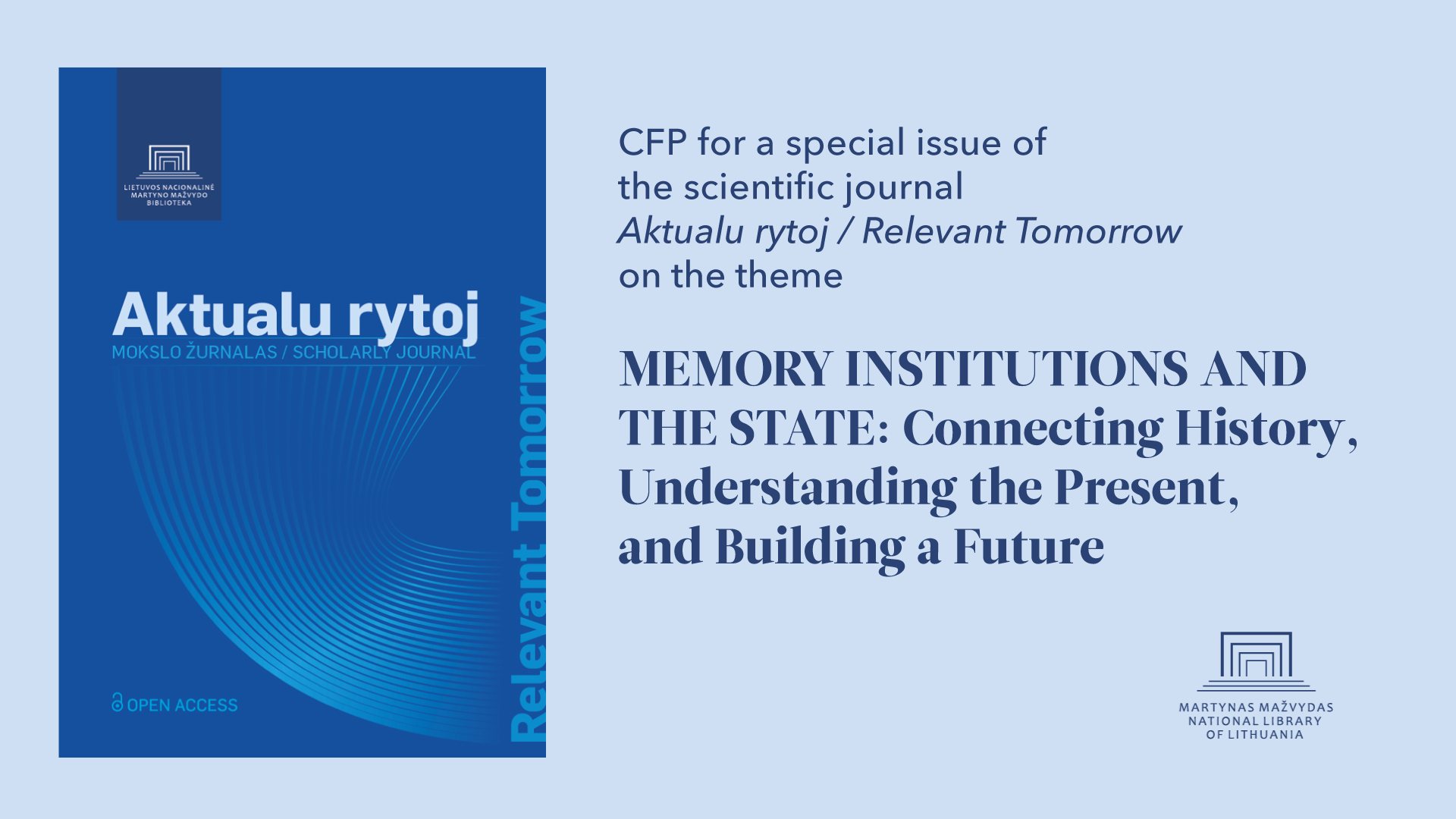On its 105th anniversary, the Martynas Mažvydas National Library of Lithuania is issuing a CFP for a special issue of the scientific journal "Aktualu rytoj / Relevant Tomorrow" on the theme

MEMORY INSTITUTIONS AND THE STATE: Connecting History, Understanding the Present, and Building a Future
Deadline for full paper submissions is March 10th, 2025.
Memory institutions, such as libraries, archives, museums, and public galleries are pivotal in documenting and preserving cultural heritage and shaping collective memory. As the custodians of society’s historical and cultural narratives, these institutions often find themselves at the intersection of state policies, societal needs, and technological advancements.
The relationship between memory institutions and the state raises fundamental questions about governance, access, representation, and preservation.
We welcome original papers on the following topics:
- What role do memory institutions play in shaping national identity and collective memory?
- What is/was/has been the connection between memory institutions and the state (regional, historical perspective)?
- What is the direction of cultural policy in shaping the preservation of memory?
- What is the relationship between memory institutions and politics of memory? How do memory institutions contribute (or can contribute) to the making of state memory policy? Should they try to contribute to the making of this policy?
- What impact does the presence or absence of interconnections between institutional and community initiatives have on the preservation of memory?
- What is the convergence between non-governmental organizations (NGOs) and memory institutions in preserving and promoting cultural heritage? How do NGOs influence memory institutions, and what are the implications of these collaborations?
- What is the future of memory institutions in the face of technological and societal changes? How can memory institutions innovate to meet the challenges of a rapidly changing world? Stories of success and challenges.
- How are memory institutions contributing to achieving the Sustainable Development Goals (SDGs)? What specific activities are being undertaken to support these goals?
- What are the best practices for implementing educational and dissemination activities within memory institutions to ensure effectiveness and broad accessibility?
- What is the role of memory institutions in strengthening democracy, in the current geopolitical context?
- What are the key research directions in the field of memory institutions?
- How do memory institutions navigate the influence of political agendas? What is the role of memory institution managers/staff in navigating among different political agendas?
- How does state funding shape the priorities of cultural heritage projects? What are the implications of funding cuts and budget constraints on the sustainability and autonomy of memory institutions within the state?
This special issue of Aktualu rytoj / Relevant Tomorrow (https://journals.lnb.lt/relevant-tomorrow) invites to explore the dynamic relationship between memory institutions, the nation and its government through various historical and contemporary perspectives. The special issue is scheduled for Relevant Tomorrow, Volume 5, Issue 27 (2025).
We are pleased to introduce Dr Ingrida Veliutė (https://orcid.org/0000-0003-2630-9519) as the Editor-in-Chief for this special issue. Dr Veliutė serves as the Deputy CEO for Research and Strategic Development at the Martynas Mažvydas National Library of Lithuania. With over two decades of experience, she has worked in cultural policy development, strategic project management, and publishing both in Lithuania and internationally. Drawing from her experience as a former Vice Minister of Culture, Dr Veliutė offers a unique understanding of both institutional and governmental perspectives.
Together, we have the opportunity to explore the crucial relationship between memory institutions and the state, a topic made even more significant by the recent invasion of Ukraine. This issue will examine how libraries, museums, and archives have served as pillars of national trust and resilience in times of crisis.
The Scientific Editor, Dr Darius Žiemelis (https://orcid.org/0000-0003-4958-9883), whose expertise will be essential in guiding the development of this issue, will support Dr Veliutė. This journal aims to foster meaningful dialogue on the shared global experiences of memory institutions and their vital role in documenting history during turbulent times.
We look forward to your valuable contribution to this important discussion.
Submissions should be made through the Aktualu rytoj / Relevant Tomorrow submission site https://journals.lnb.lt/relevant-tomorrow/about/submissions
Manuscripts should strictly adhere to journal‘s submission guidelines. These guidelines is available on the journal’s website https://journals.lnb.lt/relevant-tomorrow/about/submissions.
If you have any questions or comments about the special issue, please write to Relevant.Tomorrow@lnb.lt, and the issue's editor, Dr. Ingrida Veliutė, and the journal's editor, Dr. Darius Žiemelis, will respond as soon as possible.








